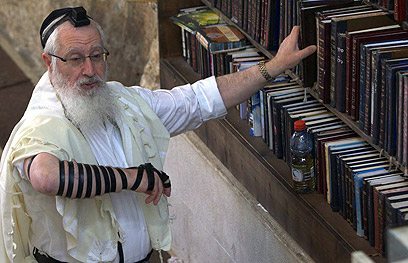
Yosef was the rabbi of the Givat Moshe neighborhood in Jerusalem and head of the Hazon Yaakov Yeshiva, and was known as a prominent right-wing rabbi.
Rabbi Ades, who was at Yosef's deathbed, said that the rabbi asked him to make the statement on his behalf before his burial. "He reviewed it again and asked me to say it here, that the legal system and authorities must not intervene in this matter."
Another message Rabbi Ades relayed on behalf of the deceased was that girls should not volunteer for National Service, saying that "there are terrible things there."
From Shas to 'King's Torah'
Rabbi Yaakov Yosef's relationship with his father were complicated and had ups and downs, as the two has differences of opinion on halachic and political issues.
Rabbi Yosef Jr. served as a Knesset member on behalf of Shas, but later left the party and was known as holding right-wing opinions – some would even say radical – and was one of the leaders of the National Union.
The disagreements in the Yosef family did not stop rabbi Ovadia from visiting his sick son recently, and even publicly commenting on his condition. "Unfortunately, my son Rabbi Yaakov, who tries to study Torah every day – has fallen ill recently," he said during one of his lessons. "Now he is very sick, and I ask of you, anyone who can, to pray for him – so that God sends him a full recovery."

Apart from his rabbinical activity, Rabbi Yaakov Yosef was involved in the past few years in two high-profile affairs – as the most senior rabbi to support the legal battle against racial discrimination in haredi educational institutions, and as one of those who signed on the conclusions of the book "The King's Torah," which discusses whether it is permissible for a Jew to kill a gentile. He was even questioned by the police over the latter affair, but was not charged.
Israel's Chief Ashkenazi Rabbi Yona Metzger said Friday that "Rabbi Yaakov Yosef's passing is a huge loss to the Jewish people, to the land of Israel and to the Sephardic world of Halacha. Truth was his guiding principle… He stuck to his internal truth and never gave up."
Rabbi Metzger added that "his love for the Land of Israel was immense and he was deeply sorry for every single piece of the Land of Israel returned as if he had lost a valuable diamond and cried about it from the bottom of his heart.
"He was famous for his extreme modesty and contented himself with little all his life. He cared for the education of Israel's boys and girls, and felt the pain of each Sephardic Jewish girls forced to deal with a wave of obstacles and difficulties while seeking to be admitted into an educational institution – and supported a public battle over that."















